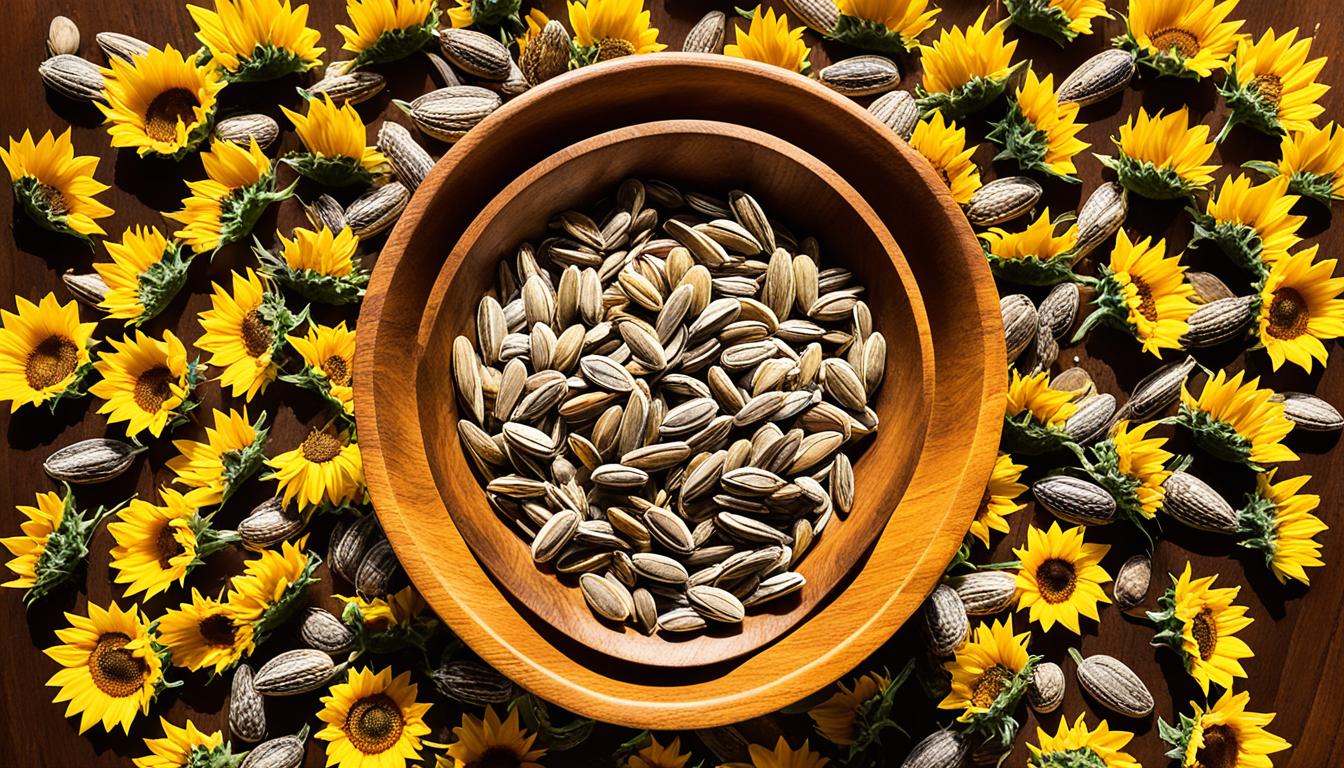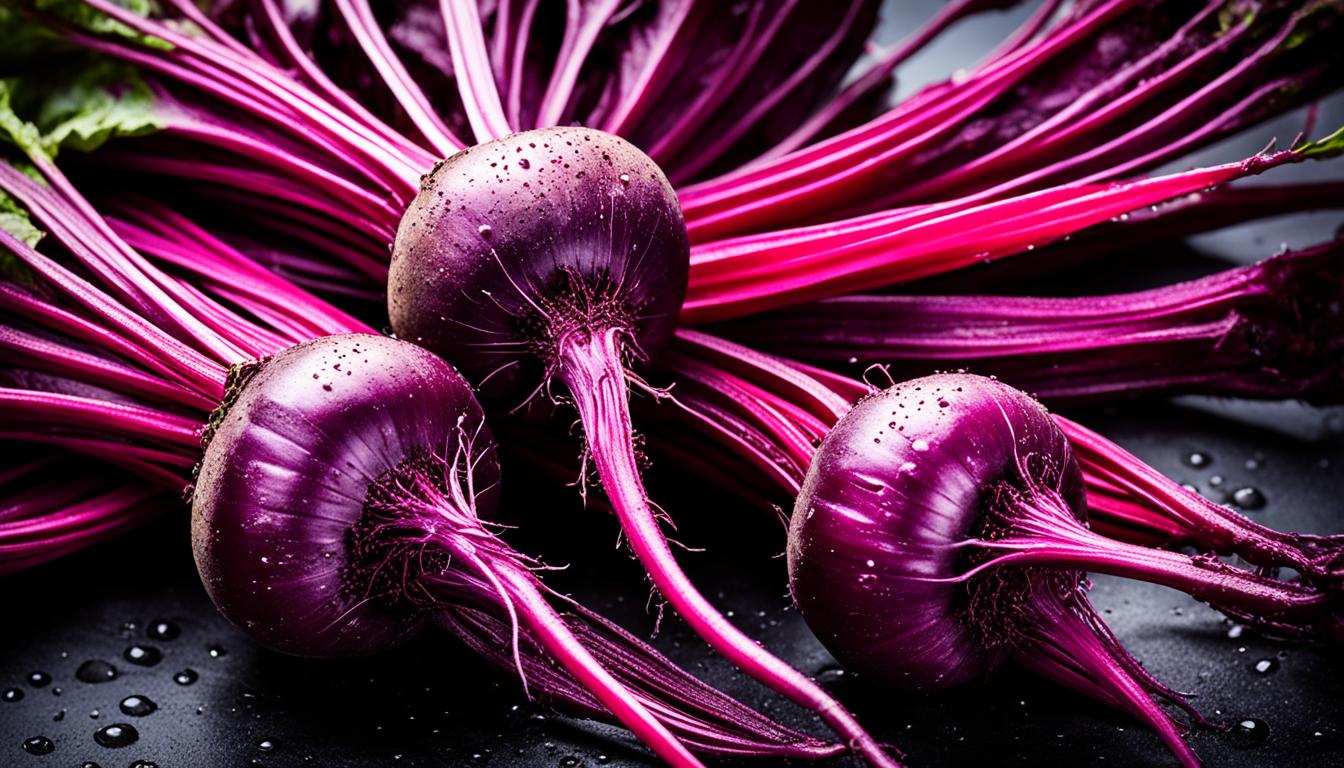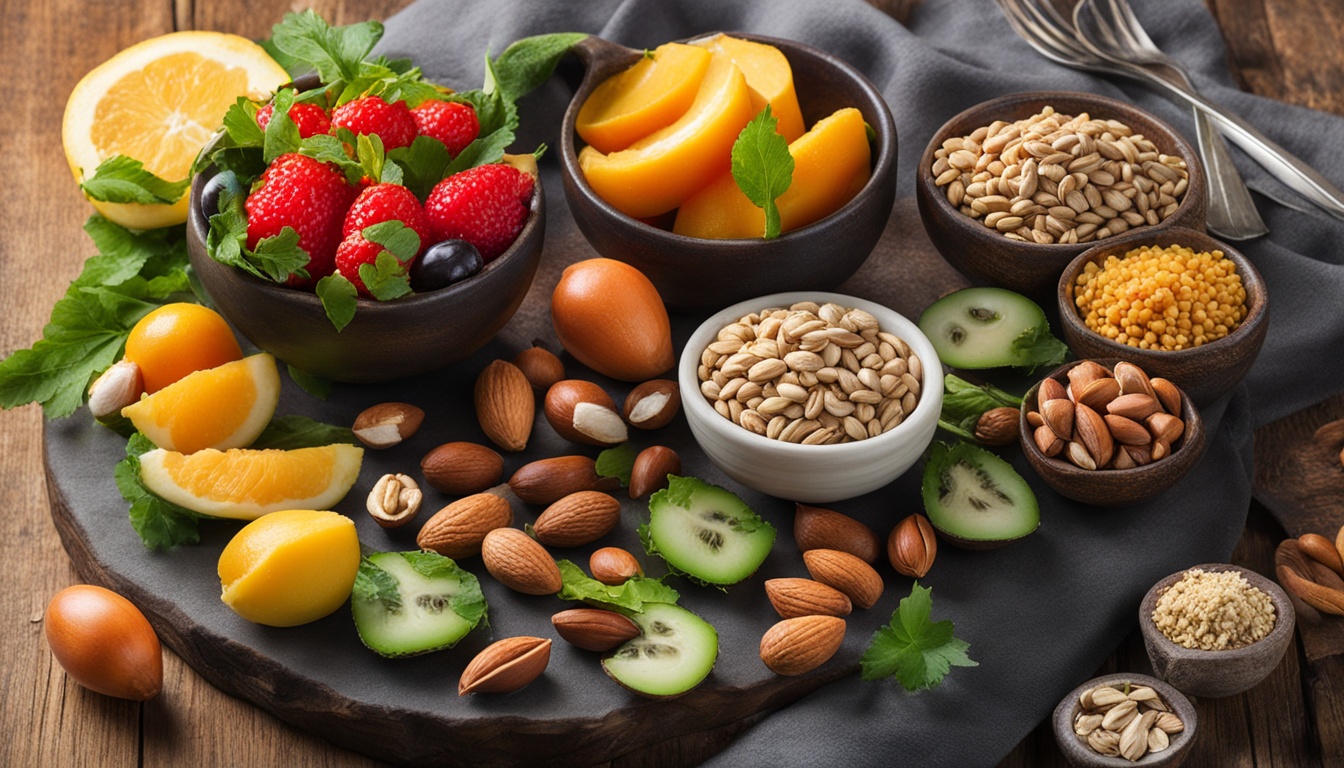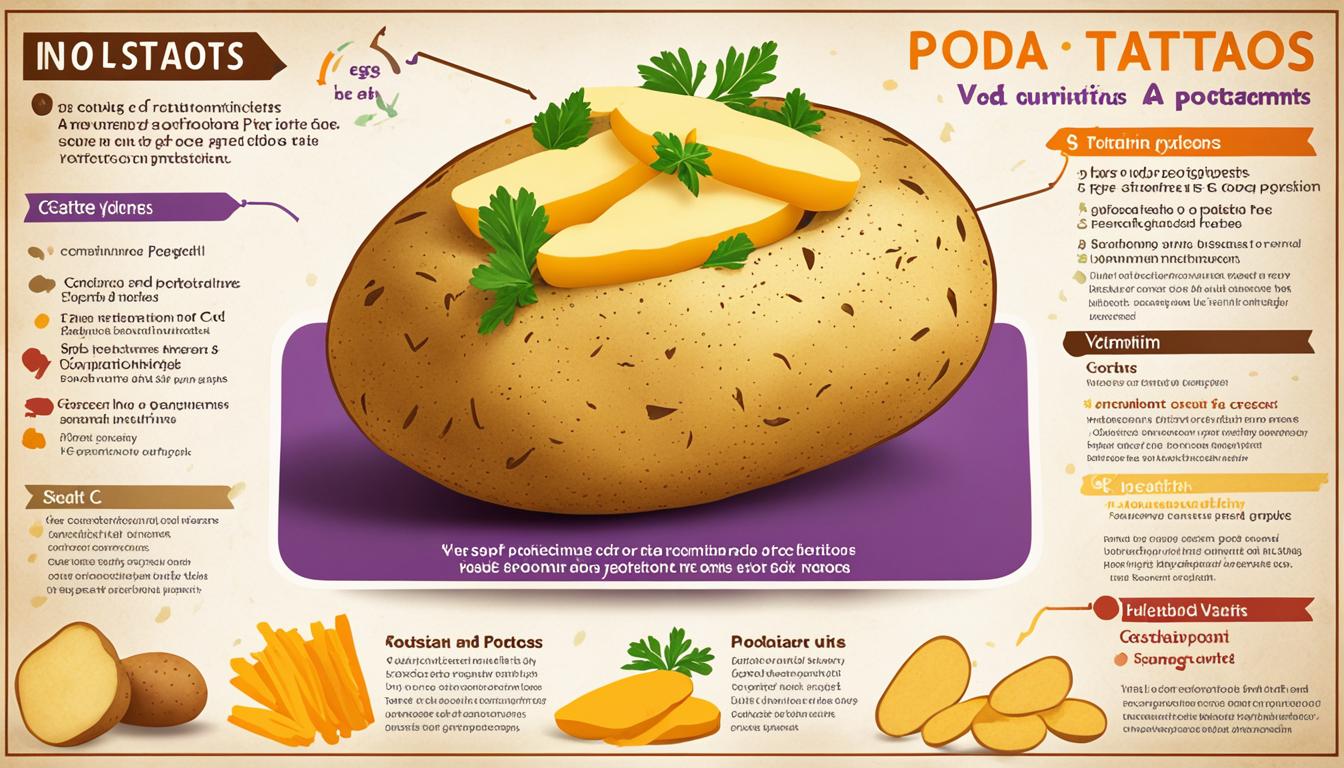Did you know that 100 grams of sunflower seeds pack 585 calories of energy? These small kernels are bursting with protein, fiber, and good fats. They are well-known for their crunchy texture and nutty taste. You can find them in many products, like sunflower seed butter or roasted, salted, and lightly seasoned seeds. But not only are they delicious, sunflower seeds also give your body important vitamins, minerals, and antioxidants. These nutrients boost your health in many ways.
Key Takeaways
- Sunflower seeds are a nutrient-dense superfood packed with protein, fiber, and healthy fats.
- They are a versatile ingredient that can be enjoyed as a snack, in baking, or as a topping for salads and other dishes.
- Sunflower seeds are a rich source of essential vitamins, minerals, and antioxidants, offering a range of health benefits.
- Sunflower seeds are commonly found in a variety of products, including sunflower seed butter and roasted, salted seeds.
- The impressive nutritional profile of sunflower seeds makes them a true superfood that deserves a place in a healthy, balanced diet.
What are Sunflower Seeds?
Sunflower seeds are the edible kernels from the sunflower plant. This plant is famous for its big, bright yellow flowers. The what are sunflower seeds are at the core of the sunflower head. You’ll find different types of sunflower seeds, from striped to black sunflower seeds varieties. They might be small, but these seeds are rich in vitamins, minerals, and healthy fats.
The Humble Beginnings of a Nutritional Powerhouse
The tiny kernels in sunflowers are well known. They’re crunchy and taste a bit nutty. People have eaten them for ages all over the world. Despite their size, sunflower seeds are full of essential nutrients. This makes them a superfood.
Varieties of Sunflower Seeds: From Striped to Black
We often see striped sunflower seeds, but there’s more. Black sunflower seeds are also out there. Each type has a different taste and nutrients. No matter the kind, sunflower seeds are a great addition to your diet.
| Sunflower Seed Variety | Appearance | Flavor Profile | Nutritional Highlights |
|---|---|---|---|
| Striped Sunflower Seeds | Gray or black and white striped shell | Mild, nutty flavor | High in protein, fiber, and healthy fats |
| Black Sunflower Seeds | Solid black shell | Richer, more intense flavor | Slightly higher in antioxidants and minerals |
| Roasted Sunflower Seeds | Toasted, golden-brown shell | Roasted, savory taste | Increased crunch and nutty aroma |
| Salted Sunflower Seeds | Striped or black shell with added salt | Salty, savory flavor | Higher in sodium, so consume in moderation |
Nutritional Breakdown: A Comprehensive Look
Sunflower seeds are packed with nutrition, making them stand out. They’re rich in healthy fats, mainly unsaturated types. Besides, they have a lot of protein and not much carbs.
Macronutrient Profile: Fats, Proteins, and Carbohydrates
A single serving of sunflower seeds is about one-fourth cup. It has 207 calories, 19 grams of fat, and 5.8 grams of protein. Such a balance in fats and proteins makes them an excellent choice for a balanced diet.
Micronutrient Powerhouse: Vitamins and Minerals
Sunflower seeds bring a mix of vitamins and minerals. You’ll find vitamin E, various B vitamins, copper, magnesium, and more in them. A quarter cup gives you 49% of vitamin E’s RDA, 68% of copper, and 31% of manganese. With these benefits, it’s clear why people love adding sunflower seed nutrition to their meals.
| Nutrient | Amount per 1/4 cup Serving | % of RDA |
|---|---|---|
| Calories | 207 | – |
| Total Fat | 19 g | – |
| Carbohydrates | 7 g | – |
| Fiber | 3.9 g | – |
| Protein | 5.8 g | – |
| Vitamin E | – | 49% |
| Copper | – | 68% |
| Manganese | – | 31% |
sun flower seeds: A Superfood in Disguise
Sunflower seeds are tagged as a superfood for many reasons. They are packed with nutrients and offer a broad range of health perks. One big plus is their high vitamin E, a strong antioxidant. This fights free radicals and helps guard against diseases like cancer.
Antioxidant Properties: Fighting Free Radicals
The antioxidants in sunflower seeds are vital for good health. Abundant in these seeds, vitamin E is a top antioxidant. It fights free radicals, lowering the risk of major illnesses and supporting the body’s defenses.
Heart-Healthy Fats: A Cholesterol-Lowering Ally
Beyond antioxidants, sunflower seeds also offer healthy fats. These include monounsaturated and polyunsaturated fats. Known for their heart benefits, they help lower cholesterol and reduce heart disease risk. Their phytosterols add to this, making them an excellent choice for a healthy heart.
Incorporating Sunflower Seeds into Your Diet
There are many tasty ways to add sunflower seeds to your meals. One simple way is to use them as a nutritious snack. You can have them plain, roasted, or with a bit of seasoning. They’re a great satisfying treat you can eat anywhere.
Snacking on the Go: Sunflower Seeds as a Portable Treat
A one-quarter cup of dry roasted, unsalted sunflower seeds gives you 207 calories. They have 19 grams of fat and an important 3.9 grams of fiber. Each serving of shelled sunflower seeds comes with about 70 mg of salt per 1 oz. So, it’s best not to eat too many to keep your salt intake low.
Culinary Versatility: From Baking to Salad Toppings
Sunflower seeds are great for more than just snacking. You can bake them into items like bread or muffins. Or, you can sprinkle them over salads, yogurt, or oatmeal for that satisfying crunch. Their flexibility makes sunflower seeds a versatile ingredient for a healthy diet.
Sunflower seeds can be a handy snack or a cooking staple. They offer both taste and nutrition to boost your health.
Health Benefits of Sunflower Seeds
Sunflower seeds are considered a superfood because they offer a lot of health benefits. They are packed with good fats that work to lower bad cholesterol. This helps reduce the risk of heart disease and keeps your cardiovascular health in check.
Additionally, sunflower seeds are a prime source of selenium, a mineral crucial for thyroid function. They also contain antioxidants and anti-inflammatory compounds that boost the immune system and fight inflammation. This turns sunflower seeds into a powerhouse for maintaining a healthy diet.
Promoting Cardiovascular Health
The beneficial fats in sunflower seeds can decrease your bad cholesterol levels. They work to lower the risk of heart disease, supporting a healthy heart. Include sunflower seeds in your diet for these heart-protective benefits.
Supporting Thyroid Function
The essential mineral selenium in sunflower seeds is great for your thyroid. Making sunflower seeds part of your diet supports a healthy thyroid. This helps keep your hormones and body in balance.
Boosting Immunity and Fighting Inflammation
The antioxidants and anti-inflammatory properties of sunflower seeds strengthen your immune system. They also cut down on inflammation. This overall health boost might lower your chances of chronic illness.
Sunflower Seeds for Specific Dietary Needs
Sunflower seeds are great for vegan and vegetarian diets. They are a rich source of protein. Sunflower seeds are also gluten-free, which is perfect for people with gluten issues or celiac disease. They are nut-free too, offering a great snack or ingredient for those with nut allergies. This makes them a wholesome choice for many dietary preferences.
Vegan and Vegetarian-Friendly Protein Source
They are perfect for vegan and vegetarian life. One ounce packs 5.5 grams of protein. This is a big help for those skipping meat. Plus, they’re stacked with vitamins and minerals. It turns any vegan or vegetarian dish into a hearty meal.
Gluten-Free and Allergy-Friendly Option
Being gluten-free is just part of their charm. Sunflower seeds are also safe for folks with nut allergies. This makes them great for many recipes and snacks. They are a safe option, fitting into various allergy-friendly diets with ease.
Growing Sunflowers: From Seed to Snack
Sunflowers are easy to grow, perfect for any gardener. The journey from planting to picking the flowers is quite fulfilling. After these flowers bloom, you can collect their seeds for eating.
Sunflower Cultivation: A Beginner’s Guide
Planting sunflowers needs the right time. In the south, April is good for outdoor seeds. March is ideal for starting indoors before moving them outside. It takes about four months from planting to see the flowers.
Sunflowers love sunlight and warm weather over 50°F (10°C). Plant them 1 inch deep and 4 inches apart. Then, make sure there’s 12-18 inches between each plant. During the growth, fertilize with special feeds to help them along.
Harvesting and Processing Sunflower Seeds
Harvest the seeds when two-thirds of them are striped black and white. This shows good pollination. Just cut the flower heads and pick out the seeds.
Next, dry the seeds. Spread them in a dry place for a few weeks. After they’re dry, you can eat the seeds raw, roast them, or add salt for a tasty snack.
With the right care, anyone can grow and enjoy sunflower seeds. It’s a great activity, whether you love gardening or are just starting out.
Sunflower Seeds in Traditional and Cultural Practices
Sunflower seeds have been key in many cultures for a long time, especially among indigenous people. They were not just eaten but used for health and in religious acts too. These traditional uses of sunflower seeds point to how important they are across different groups.
Indigenous Uses of Sunflower Seeds
The Cochiti people found sunflower stem juice great for healing wounds fast and without infection. Many Native American tribes also used sunflowers for various health issues like kidney problems and chest pains. They even helped with tiredness, making people want to eat more, and cleaning cuts. The indigenous uses of sunflower seeds show their many health benefits.
Sunflower Seeds in Folklore and Symbolism
Sunflower seeds mean more than just food. They symbolize good things like a bright future, wealth, and the power of the sun. The sunflower seeds’ folklore and symbolism speak to their deep meaning in culture. For example, Native Americans have made sunflower seeds 1,000 percent bigger over 3,000 years. This shows how much they respect these seeds.
For centuries, sunflower seeds have been important in traditional ways and as a part of cultural beliefs for indigenous people. These traditional uses, indigenous practices, and cultural associations with sunflower seeds show its lasting value in history.
Sunflower Seed Products: Beyond the Shell
Sunflower seeds are more than just a snack or cooking ingredient. When ground into a creamy spread, they become sunflower seed butter. It’s a tasty, nut-free option that’s perfect for people with allergies or those looking for variety.
Sunflower Seed Butter: A Nutty Alternative
Sunflower seed butter is flying off the shelves for good reason. It’s a creamy, smooth spread perfect for anyone avoiding nuts. Made from finely ground sunflower seeds, it’s like having nut butter but without the nuts.
Sunflower Oil: A Versatile Culinary Oil
Sunflower oil has many uses. It’s good for cooking, baking, and even skincare. It’s loved for being flavorless and having a high smoke point. This makes it great for many cooking methods. The uses of sunflower products show they’re more than just snacks.
Conclusion
Sunflower seeds are full of goodness, providing tons of vitamins, minerals, good fats, and plant nutrients. They help keep your heart healthy, support your thyroid, boost your immune system, and fight off swelling. These seeds are not only good for you but are also easy to include in your meals and have cultural importance. Every health-minded person should have them in their kitchen. Knowing how nutritious and versatile sunflower seeds are, you can explore many delicious and healthy recipes.
Sunflower Seeds: A Sustainable and Eco-Friendly Choice
Sunflower seeds offer great nutrition and are eco-friendly. Growing sunflowers needs less and helps the earth. They’re good for the soil and help wildlife, making them a green choice.
Sunflower Cultivation and Environmental Impact
Organic sunflowers give almost as much as those with chemicals. They use fewer pesticides too. Plus, sunflowers clean water by removing metals fast, helping the environment.
Sustainable Farming Practices for Sunflower Seeds
Farmers are using better ways to grow sunflowers that protect the environment. This includes using less water, fewer chemicals, and growing them next to different plants. Sunflowers, compared to other crops, don’t release a lot of gases. They’re also good at getting weeds without chemicals.
Buying sunflower seeds means you’re helping the planet. It supports a farming way that’s gentle on nature. So, it’s a good pick for people who care about the earth.
FAQ
What are sunflower seeds?
What are the different varieties of sunflower seeds?
What is the nutritional profile of sunflower seeds?
Why are sunflower seeds considered a superfood?
How can sunflower seeds be incorporated into the diet?
What are the health benefits of consuming sunflower seeds?
Are sunflower seeds suitable for specific dietary needs?
How can sunflower seeds be grown and harvested?
What is the cultural significance of sunflower seeds?
What other sunflower seed-based products are available?
Are sunflower seeds a sustainable and eco-friendly choice?
Source Links
- https://pharmeasy.in/blog/health-benefits-of-sunflower-seeds/
- https://health.clevelandclinic.org/are-sunflower-seeds-good-for-you
- https://en.wikipedia.org/wiki/Sunflower_seed
- https://www.healthline.com/nutrition/sunflower-seeds
- https://www.webmd.com/diet/health-benefits-sunflower-seeds
- https://www.verywellfit.com/calories-in-sunflower-seeds-and-their-health-benefits-4119941
- https://www.kindearth.net/super-seed-energy-balls-with-hemp-pumpkin-flax-and-sunflower-seeds/
- https://www.womenshealthmag.com/food/a28983560/are-sunflower-seeds-healthy/
- https://www.eatingwell.com/article/2059940/sunflower-seeds-nutrition/
- https://www.learningwithexperts.com/gardening/blog/how-to-grow-sunflowers-a-step-by-step-guide
- https://www.reneesgarden.com/products/sunflower-edible-snack-seed
- https://www.sebiology.org/resource/the-ever-increasing-role-that-sunflowers-play-in-society.html
- https://plants.usda.gov/DocumentLibrary/plantguide/pdf/pg_hean3.pdf
- https://proseedcup.com/
- https://www.mygerbs.com/product-category/seeds/sunflower-seeds/whole-sunflower-seeds/
- https://www.health.com/sunflower-seeds-benefits-8430644
- https://www.ncbi.nlm.nih.gov/pmc/articles/PMC5622016/
- https://www.sciencedirect.com/topics/agricultural-and-biological-sciences/sunflower-seed
- https://www.ecofriendlyhomestead.com/sustainable-garden/learn/sunflower-seed-how-to-grow
- https://www.ocl-journal.org/articles/ocl/full_html/2017/03/ocl170006/ocl170006.html




